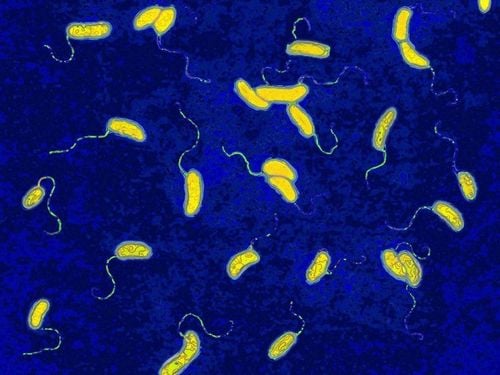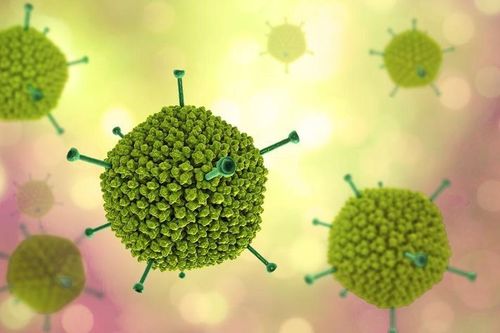This is an automatically translated article.
The article was professionally consulted by Specialist Doctor II Cao Thi Thanh - Pediatrician - Department of Pediatrics - Neonatology - Vinmec Hai Phong International General Hospital. Dr. Thanh has worked for 25 years in the treatment of neonatal pediatric diseases.Children with immature digestive systems are often more susceptible to gastrointestinal diseases than adults. This can help stimulate the child's immune system on the one hand, but on the other hand, if not treated in time, many diseases can have dangerous complications.
1. Diarrhea
Diarrhea is a common illness in young children. The cause can be a viral or bacterial infection. Outward manifestation of the disease is a child passing loose stools more than 3 times a day, which may be accompanied by symptoms such as abdominal pain, nausea, bloating, dehydration and fatigue.Diarrhea in young children is a common disease, but if diarrhea lasts for a long time, the child will lose water and electrolytes. Parents need to timely rehydrate the baby with water and electrolytes with Oresol. Give the child to drink properly, drink little by little, drink continuously and scattered throughout the day.
If the disease progresses more seriously, parents should take the child to a medical center for treatment, should not arbitrarily buy drugs to use to limit unexpected incidents that may occur.
2. Cholera
Cholera is an extremely dangerous disease that can spread into an epidemic, patients, especially young children, if not treated promptly, have a high risk of death.The main identifying feature of cholera is massive watery diarrhea, continuous vomiting, abdominal pain. Diarrhea is the most worrisome dangerous symptom. Baby can go to the toilet continuously, can't hold it, the stool is full of milky white water. Children become severely dehydrated, exhausted, and can die very quickly.
Diseases caused by bacteria (Vibrio cholerae). This type of bacteria often appears in dirty places, unsanitary water sources, stale, undercooked food or infested with flies. When children eat and drink in that environment, bacteria will follow the food into the digestive system, they grow and secrete many disease-causing toxins.
Therefore, to prevent cholera for children, it is necessary to keep food and drink hygiene, use boiled water to cool, limit the use of drinking water on the sidewalk that has not been sterilized or bottled. Food must be thoroughly cooked. Families can also teach children the habit of washing hands before eating and after using the toilet to limit infection.
3. Digestive disorders

Trẻ nhỏ là đối tượng dễ bị rối loạn tiêu hóa do hệ thống tiêu hóa chưa được hoàn thiện
Young children are susceptible to digestive disorders because the digestive system has not been perfected both in terms of structure, activity and amount of digestive enzymes. Moreover, children's resistance is weaker, so they are prone to gastrointestinal disorders. Improper nutrition or use of antibiotics are also causes of this unpleasant disease.
Long-term digestive disorders cause children not to fully absorb nutrients for healthy development. As a result, children often suffer from malnutrition, physical retardation and underdeveloped immune systems.
4. Constipation
Constipation is a common symptom in children. Babies are constipated when the number of bowel movements is less than usual, the stools are more solid. Children sometimes have abdominal pain when defecating, straining when going to the toilet, burning pain, even anal fissures leading to bleeding...The disease can be found in children who are lazy to eat vegetables and rich foods fiber, less water,...but can also be seen in children with bowel dysfunction. If your baby is constipated, you can add fiber-rich vegetables and fruits to your baby's diet. You can also give your baby more water to drink during the day.
Some laxatives or supplements can also help if the baby is old enough and the constipation is severe. But it is best, parents should take the child to see a doctor for the best support depending on the condition of each child.
5. Intestinal obstruction
When the bowel is blocked, the child cannot go to the toilet, nor can he pass a bowel movement. The first symptom of a child is often vomiting a lot, then vomiting can be bile.In infants with intestinal obstruction, there may be intussusception or inguinal hernia, also due to a malformation of the gastrointestinal tract, there is a place of torsion.
In this case, it is imperative to bring the baby to the hospital early for timely treatment.
6. Dysentery
Dysentery is caused by Amoeba and Shigella, people with dysentery have very little stools but with mucus and blood along with symptoms such as fever, abdominal pain, always feeling like having a bowel movement.This condition lasts for a long time, leading to the child becoming weak, struggling, comatose and then dying. The primary risk of dysentery is to become chronic, long-lasting.
7. What to do when the child's digestive system has abnormal signs?

Khám rối loạn tiêu hóa cho trẻ














